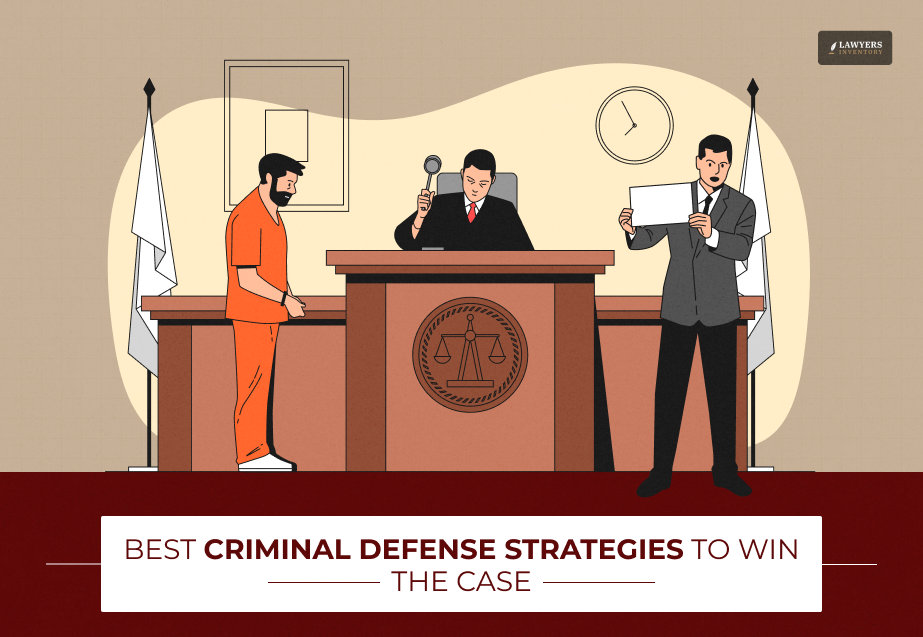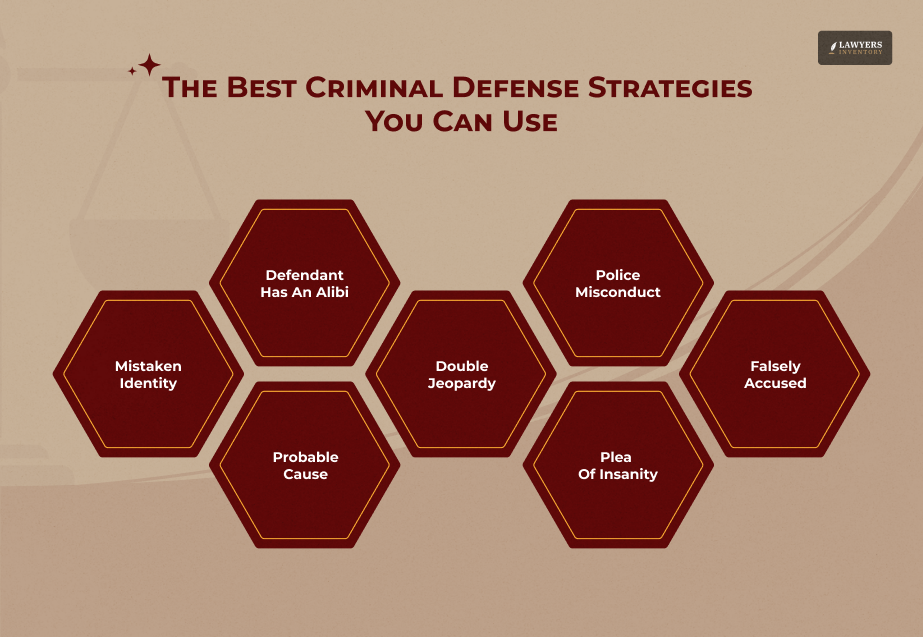
Having the best criminal defense strategies is one of the most important responsibilities for every criminal lawyer. These legal strategies or arguments aim to create a sense of doubt about the charges that the prosecution has made, thus ensuring the accused gets a clean chit.
Having an experienced lawyer by your side who is aware of all the possible tactics that they can use to save their client from getting jailed is all that one needs. Additionally, it is important that you are able to choose a lawyer who is aware of the local laws.
For instance, a Lakewood criminal defense attorney is someone who will be able to give you the best results when it comes to that specific locality. But is that all?
In this article, I will talk about the following things:
- How criminal cases differ from other cases.
- What are criminal defense strategies?
- Best criminal defense strategies to win.
Additionally, I will also talk about some of the questions that people also ask when it comes to criminal defense strategies. Therefore, if these are what you want to know, keep on reading this blog till the end…
How Are Criminal Cases Different From Other Cases?
When a government entity seeks to prosecute a person for a crime that it believes has been committed, this is known as a criminal case.
In a criminal case, the prosecutor must prove the elements of the crime at a higher standard, “beyond a reasonable doubt,” than in other types of cases. If the defendant is found guilty, they may face penalties, such as being sentenced to jail.
Other cases (for example, civil cases) usually consist of private parties having a disagreement. Proof in a civil case must typically only establish a “preponderance of evidence” standard. If damages are awarded, they usually are monetary damages, and there is no jailing for losing a civil case.
Criminal cases are quite distinct from other cases, especially civil cases, with respect to the offended party, purpose, burden of proof, defendant’s constitutional protections, and the possibility of penalty.
And that is not all. According to LawHelp.Org, even the courts have different powers when it comes to criminal and civil cases. “Criminal Court judges can punish you for breaking the law by sending you to jail. Civil Court judges can order you to pay money or a fine, or make decisions about your family or your home.”
What Are The Best Criminal Defense Strategies You Can Use?

Criminal defense strategies are primarily the legal arguments and actions that a lawyer carries out to get charges dismissed. These are the ways with which a lawyer ensures to preserve the defendant’s freedom.
Legal Zoom defines it as “legal strategies that can reduce or eliminate a defendant’s liability for a crime.”
These strategies involve highlighting legal errors and doubts about any of the prosecution’s elements of the crime that must be proven beyond a reasonable doubt in order to obtain a conviction.
Here are some of the best criminal defense strategies that you need to know:
1. Mistaken Identity
Witness misidentification is a leading cause of wrongful allegations. This occurs when a witness observes an account, the description captures a person’s unique characteristics, and the witness thinks that someone fitting the description is the offender.
Additionally, it also happens when the witness assumes someone committed a crime based on a set of circumstances. In addition, the witness might be covering for a crime they committed.
2. Accident
Most crimes in the California Penal Code are reasonably considered intentional crimes, in which the perpetrator acted on purpose in committing the crime. This is significant. If your defense attorney can somehow establish that the act was unintentional and not with criminal intent, it is a pretty good defense to the act, even first-degree murder.
3. Duress Or Immediate Danger
If a person commits a crime simply because they believed they were in an immediate danger of harm, their act may not be a crime because they acted under duress.
4. Defendant Has An Alibi
A defendant cannot be guilty of many crimes if their attorney can show that they were not at the location of the crime when it occurred; then, they would not be capable of committing the crime alleged.
5. Entrapment
Entrapment involves a normally law-abiding citizen committing an act of wrongdoing due to harassment or pressure or because the police have gone too far attempting to persuade someone to violate the law.
6. Compelled Or False Confessions
In numerous instances, police have been known to obtain forced confessions from innocent suspects utilizing various mental tactics and even physical threats, neglect of their food and sleep.
7. Police Misconduct
Regrettably some law enforcement agents commit misconduct during their investigation. Officers may have an interest in covering up a mistake from the first investigation or an officer may have a strong conviction of a suspect’s guilt and they engage in misconduct to create a more solid case.
8. Falsely Accused
It is not uncommon for a person to be falsely accused of a violation that they did not commit. For example, anyone can make the following accusations without any physical evidence:
- Child abuse.
- Domestic violence.
- Sex crime.
9. Probable Cause
In 1968, the U.S. Supreme Court determined in the Terry vs. Ohio decision that an officer can stop someone without probable cause to arrest, if he can point to “specific articulable facts” to justify “probable cause” to stop the person, search him, and detain the person.
This is important because if there is no probable cause, the defense could file a motion to suppress any evidence that was obtained improperly. If key evidence is suppressed, this could cause the case to be dismissed.
10. Plea Of Insanity
In most cases, you cannot be found guilty of a crime if you are legally insane at the time of the commission of the crime because willful intent is a required element of the crime.
According to Chudnovsky Law, California courts use a definition of legal insanity known as the M’Naghten Rule in the case of Daniel M’Naghten, a Scottish woodturner who murdered an English official in 1843 while he was “suffering from paranoid delusions.”
11. Statute Of Limitations
Each state has laws that declare time limitations for the prosecution of criminal conduct. A prosecutor may not file a criminal charge for an offense that occurred over the specified time limitation.
The purpose for the limitation is to allow a conviction to rely upon the available evidence that has not degraded over time. Simply stated, once the limitations of the statute has run out, the accused is no longer accused of any crime.
Read Also: Statute of Limitations for Sexual Assault: Are There Time Limits?
12. Double Jeopardy
The US Constitution protects Americans from prosecution for the same crime on two separate occasions; it also prohibits more than one punishment for the same crime. To clarify, the suspect may not be tried in the same court for the same crime on two different occasions.
Frequently Asked Questions (FAQs):
Now that you are aware of the best criminal defense charges, let me tell you some of the questions that people also ask when they are searching for the same topic:
There are a few distinct types of criminal defenses that are frequently used, including self-defense, alibi, lack of intent to commit a crime, and constitutional violations (illegal search and seizure).
A mistake of law—meaning you did not know something was against the law—rarely operates as a defense to a crime since we are all presumed to know the law. However, in specific cases, there might be an exception to this if a person was not aware of a prohibited legal status relating to the crime—such as regarding advice from government officials–but those may be less common.
Generally speaking, if you were the initial aggressor, you cannot use self-defense; however, similar to mistake of law, there can be exceptions. For example, if you initiated a fight where only minor force was used, you may be able to argue that you acted in self-defense even if you initiated the fight if the other person subsequently escalated to deadly force.











0 Reply
No comments yet.